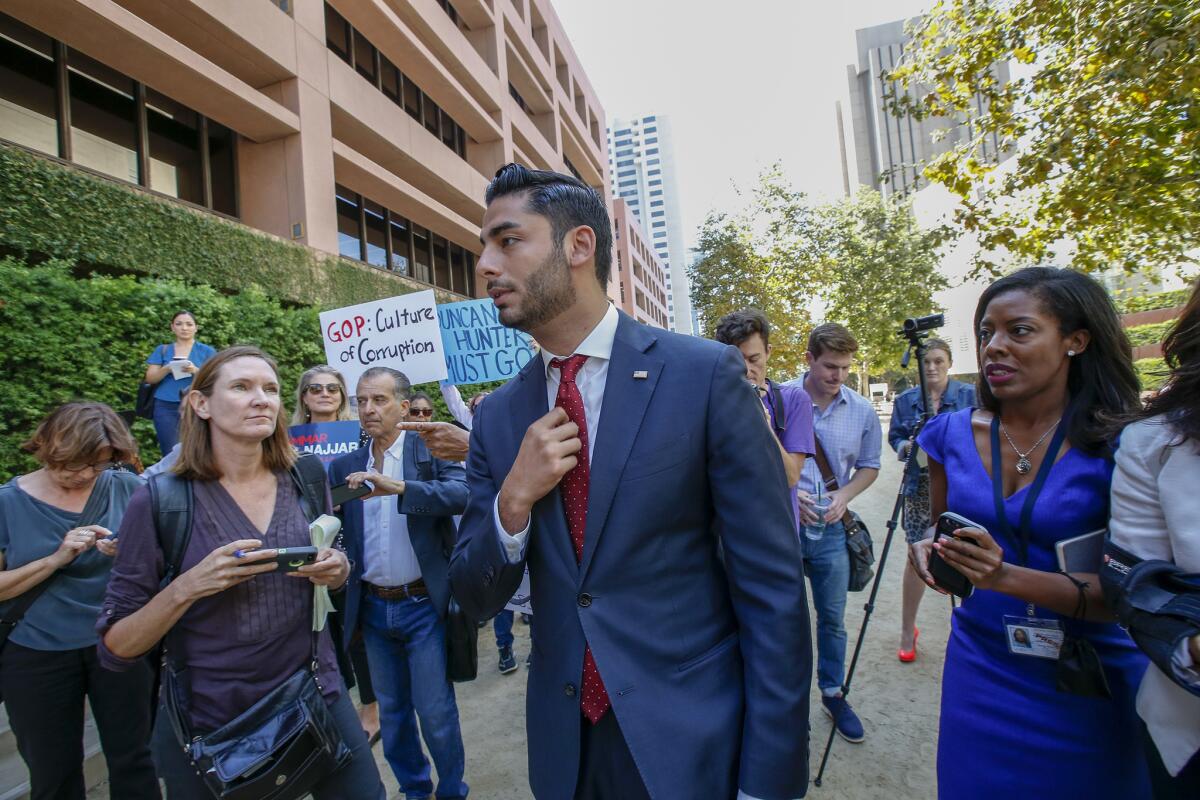Column: A Democratic race emerges in election to replace Rep. Duncan Hunter

SAN DIEGO — The focus of the 50th Congressional District race understandably has been on the Republican candidates.
It’s a heavily Republican district soon to be vacated by GOP Rep. Duncan Hunter, who pleaded guilty to felony misuse of campaign funds this month and announced he would be resigning after the holidays.
Also, Ammar Campa-Najjar, who lost to Hunter last year by only a few percentage points, was the lone Democrat in the race and was expected to advance from the March primary to the November general election.
Now he has company.
Marisa Calderon, executive director of the National Assn. of Hispanic Real Estate Professionals, had begun running in the neighboring 53rd District, where Democratic incumbent Susan Davis chose not to seek reelection. Shortly before the filing deadline, Calderon shifted to the Hunter district.
What impact she may have, and how much of a threat she poses to Campa-Najjar, is uncertain. Right now, it doesn’t seem like much. That, of course, could change depending on what kind of campaign she runs, how much money she raises and whether she has a compelling message.
More than a year after a staggering indictment, the congressman announced that he will plead guilty on campaign finance charges.
Campa-Najjar, a small-business owner and university lecturer, has been running for three years in the sprawling district, which stretches from near the border with Mexico in East County up to Temecula. He was born and raised in East County and was a political unknown until he ran against Hunter, who was under indictment during the 2018 campaign and tarnished by unflattering details of his personal behavior.
Now Campa-Najjar pretty much has become a household name in the district, in part because that race and the current one have received considerable local and national media coverage. Campa-Najjar also has built an extensive campaign, and has raised and spent millions of dollars. He has received dozens of endorsements from local, state and federal elected officials, numerous unions and Democratic organizations, including the California Democratic Party.
Polls have shown him in contention with, or ahead of, a small handful of high-profile Republican candidates. He has pursued populist themes about family economic concerns, access to health care, expanding educational opportunities, assisting small businesses and “ending corporate welfare.”
Calderon is recognized nationally in the residential real estate industry, with particular expertise in the Hispanic homebuying market. She has been director of the Hispanic real estate organization for nearly a decade. She also has experience in the financial services industry and, according to her website, has served on the advisory board of the Banc of California, the Fannie Mae Affordable Housing advisory council and the California Wilderness Coalition.
In a questionnaire for Ballotpedia, she said her top issues are addressing San Diego’s affordable housing crisis, working to fix the immigration system and protecting the environment. She’s also stressing pocketbook issues.
Given Campa-Najjar’s considerable head start, it’s hard to see what Calderon’s path to victory would be. Asked in an email about where she differed with Campa-Najjar, Calderon answered the question broadly.
“I can tell you how I differ from all the candidates: Whether it’s from being a businesswoman, or a Latina and working mom, I think voters trust real-world, non-political experience,” she said.
Ten candidates are running but only a few are well-known: former radio talk show host Carl DeMaio, former Rep. Darrell Issa and state Sen. Brian Jones among the Republicans, and Democrat Campa-Najjar.
Calderon initially set her sights on the Davis seat in a Democratic district that politically might seem more friendly. Seventeen candidates have filed to run for that office, including two women with considerable political backing and/or financial resources: San Diego City Council President Georgette Gómez and Sara Jacobs, granddaughter of Qualcomm co-founder Irwin Jacobs.
“Congress needs more well-qualified women in its ranks,” Calderon said, explaining her shift. “Since it’s clear they’re headed for that outcome in the 53rd, I turned my attention to the 50th, where that isn’t the case.”
Candidate Helen Horvath, a psychologist who is registered as having no political party preference, no doubt disagrees.
Calderon also said she was spurred to enter the race when Hunter announced his retirement, adding that “I thought I was best to stop Darrell Issa from getting back to D.C., because he’s exactly what’s wrong with Congress.”
She also said, “The lesson for a lot of Democrats coming out of 2018 is that moderate, female candidates give us our best shot to compete in battleground districts, and that’s what I intend to do here.”
Calderon said she was encouraged to run by Emily’s List, which backs Democratic women who support abortion rights. So far, she has not been endorsed by the group. She said she has been endorsed by former candidates Josh Butner and Patrick Malloy, “who together received the majority of votes cast for Democrats in the primary election in the 50th last year.”
Under the California primary system, the two candidates with the most votes advance to November, regardless of party affiliation. There was a time when some Democratic operatives thought having a second candidate in the race might land both in the fall election, given the advantageous Democratic turnout in March. But that was when the Republican field looked like it would be larger, potentially resulting in a greater split of the GOP vote.
“The math just doesn’t work,” said Will Rodriguez-Kennedy, chair of the San Diego County Democratic Party.
Rodriguez-Kennedy said he didn’t really know much about Calderon, and said of her candidacy, “It’s not helpful.” (He noted that he is friends with Campa-Najjar.)
Still, he didn’t see her as an impediment to Campa-Najjar winning one of the top two spots.
Campa-Najjar said he wasn’t overly concerned about the sudden Democratic competition.
“I don’t think too much about it,” he said. “I’m really focused on my race.”
He did question Calderon’s commitment to the East County district, in part because it wasn’t her first choice.
Calderon said she has “deep connections to this district — having worked here, and with multiple generations of my family having settled in this area of Southern California.”
One connection she doesn’t have is residency. Like DeMaio of Rancho Bernardo and Issa of Vista, Calderon, whose home is in San Diego’s College Area, lives outside the district.
Legally, that’s permissible. Politically, maybe not so much.
More to Read
Sign up for Essential California
The most important California stories and recommendations in your inbox every morning.
You may occasionally receive promotional content from the Los Angeles Times.











